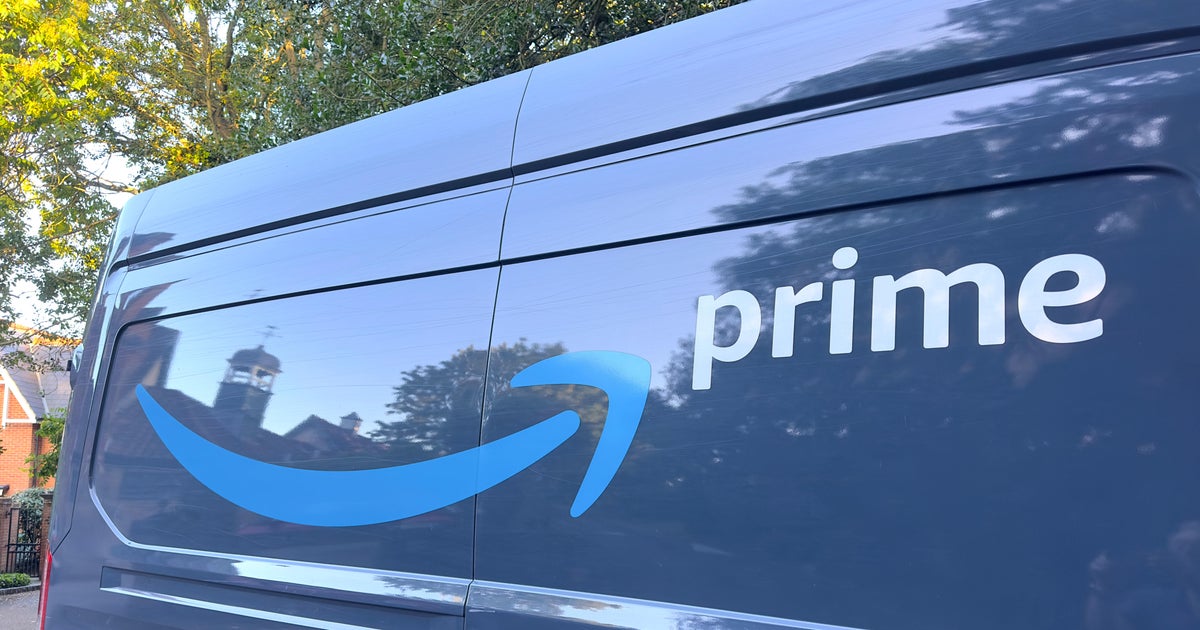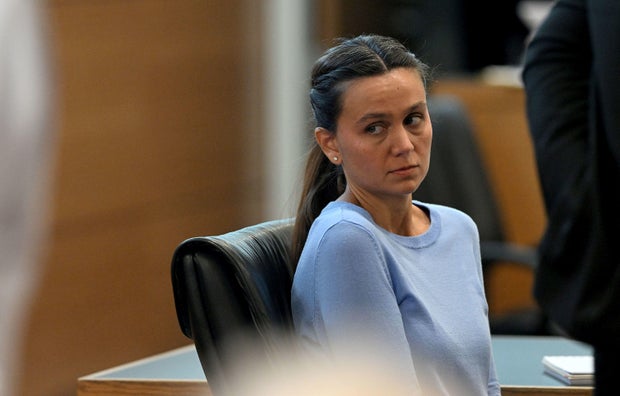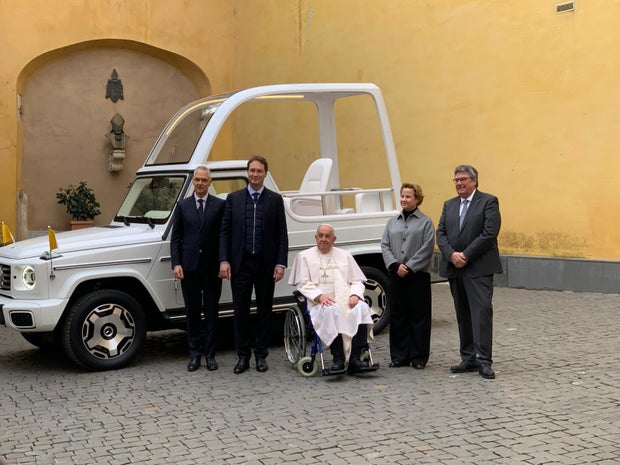CBS News
Ashley Benefield, former ballerina convicted of killing husband in “Black Swan” murder case, is sentenced to 20 years in prison

A former ballerina was sentenced to 20 years in prison Tuesday in the 2020 shooting death of her estranged husband in Florida.
CBS affiliate WTSP reports that Ashley Benefield was sentenced to 20 years, with credit for time served, followed by 10 years probation. The case, which became known as the “Black Swan murder” trial, garnered national attention, with some comparing Benefield to the protagonist of the 2010 film “Black Swan.”
The former ballerina was found guilty by a jury in July of manslaughter for shooting and killing her husband, Doug Benefield, in September 2020 after an argument.
Ashley Benefield, 32, claimed that she killed her then-58-year-old estranged husband in self defense during an argument at her mother’s home, where she had moved from South Carolina after leaving him. Authorities said she shot him twice.
“I just held the gun like in front of me and I said, stop, and he like turned and he got into this like almost like a fighting stance. He started like moving his arms and his hands around…he started coming towards me and he lunged at me, and I just pulled the trigger,” Ashley Benefield testified at her trial.
Pool/Bradenton Herald
The pair had wed after knowing each other for less than two weeks, “48 Hours” reported. At the time of their marriage, Ashley Benefield was 24 and Doug Benefield, a widower whose wife had died about nine months earlier, was 54.
As “48 Hours” reported, the marriage was rocky. There were tensions between Ashley Benefield and Doug Benefield’s teenage daughter, and an attempt to start a ballet company together failed. Ashley Benefield accused her husband of poisoning his first wife, and left him when she was pregnant with their child to stay with her mother, alleging that he was now poisoning her. The claims were investigated by police, and no charges were filed.
Once their child was born in 2018, Ashley Benefield allegedly kept the baby from her husband for six months, until a judge intervened. After this, the pair largely reconciled, and in 2020, they planned to move to Maryland together on Ashley Benefield’s suggestion.
On Sept. 27, 2020, the Benefields were packing a U-Haul truck for the move. Ashley Benefield’s mother, Alicia Byers, took her granddaughter to a park, leaving the couple alone in the house. A neighbor reported hearing sudden screaming and called 911.
Moments later, Ashley Benefield arrived at the home of another neighbor, gun in hand. She reportedly told the neighbor that she had shot her husband in self-defense. The neighbor called 911.
When police and emergency services responded, Doug Benefield was still alive but unable to speak. He died at an area hospital about an hour later.
Investigators determined that Doug Benefield had been shot twice, once in the leg and once in the arm. That second bullet traveled into his chest cavity. The shots had been fired when he was turning away from his wife, investigators determined.
Ashley Benefield’s lawyer, Faith Brown, told police at the time that her client had been planning to leave her husband and had an escape plan, including a safe place to stay, a burner phone and a rental car rented under a different name. Brown told police that Benefield feared her husband “had gotten wind of” the plan.
Ashley Benefield was arrested five weeks after the shooting.
CBS News
Hawley says Hegseth cancelled meeting as DeSantis name gets floated

Watch CBS News
Be the first to know
Get browser notifications for breaking news, live events, and exclusive reporting.
CBS News
Amazon sued over slower deliveries to low-income neighborhoods

Amazon secretly excluded two zip codes from its fastest delivery service while charging nearly 50,000 Prime members who live in the areas its full Prime subscription price, the District of Columbia’s attorney general alleges in a lawsuit filed Wednesday.
Amazon violated consumer protection laws by stopping its quickest delivery service to the two historically lower-income neighborhoods, then misled customers about why their packages were arriving later than advertised when they complained, according to the suit filed in D.C. Superior Court.
The world’s biggest online retailer’s paid subscription service, Amazon Prime, offers two-day delivery for millions of items, as well as next-day or same-day for many other products for $139 a year, or $14.99 a month.
Amazon in June 2022 decided to stop using its fleet of branded trucks to make Prime deliveries to DC zip codes 20019 and 20020, servicing them instead with third-party delivery services like UPS and the U.S. Postal Service. The company knew the decision would result in significantly slower deliveries for the areas, but did not tell existing or prospective customers, the suit alleges.
Amazon informed the attorney general’s office that the change came as the result of safety concerns for its drivers, the attorney general said. Yet the company was legally obligated to disclose the change to customers.
“Amazon is charging tens of thousands of hard-working Ward 7 and 8 residents for an expedited delivery service it promises but does not provide. While Amazon has every right to make operational changes, it cannot covertly decide that a dollar in one ZIP code is worth less than a dollar in another,” D.C. Attorney General Brian Schwalb stated in a news release.”We’re suing to stop this deceptive conduct and make sure District residents get what they’re paying for.”
Amazon Prime two-day delivery
Last year, the rest of the city’s Prime members received packages within two days of checkout 75% of the time, but those in the impacted ZIP codes received their orders within two days just 24% of the time, according to the suit.
Office of the Attorney General for the District of Columbia
Amazon dismissed as “categorically false” claims that its business practices are discriminatory or deceptive.
“We want to be able to deliver as fast as we possibly can to every zip code across the country, however, at the same time we must put the safety of delivery drivers first,” an Amazon spokesperson said in an emailed statement.
The spokesperson added, “In the zip codes in question, there have been specific and targeted acts against drivers delivering Amazon packages. We made the deliberate choice to adjust our operations, including delivery routes and times, for the sole reason of protecting the safety of drivers.”
The company said it’s clear with customers about expected delivery dates. “And we’re always transparent with customers during the shopping journey and checkout process about when, exactly, they can expect their orders to arrive,” the spokesperson said.
Amazon would like to work with the attorney general’s office to reduce crime and improve safety in those areas, the spokesperson stated. “Nevertheless, we will proceed in the process and demonstrate that providing fast and accurate delivery times and prioritizing the same of customers and delivery partners are not mutually exclusive.”
The lawsuit is not the first time Amazon has been accused of providing discriminatory service.
A Bloomberg analysis in 2016 found that Amazon excluded predominantly black ZIP codes to varying degrees from same-day delivery in six major cites. Amazon at the time said the issue had nothing to do with race.
And two years later, the since-discontinued Amazon Restaurants delivery service excluded the same D.C. neighborhoods that are the focus of the Prime delivery lawsuit. The company told local news at the time that it was working to bring more eateries online.
CBS News
Pope Francis receives first all-electric popemobile from Mercedes

Pope Francis has received the first-ever all-electric popemobile from automaker Mercedes-Benz.
The open-top vehicle, which for the last 45 years has been manufactured by the German luxury automaker, is used by Pope Francis to greet pilgrims in St. Peter’s Square during general audiences and other papal ceremonies. The company’s CEO Ola Kallenius personally handed over the new model to the pope on Wednesday at the Vatican.
“With the new Popemobile, Pope Francis is the first pope to be traveling in a fully electric Mercedes-Benz when making public appearances,” Kallenius said in a statement. “This is a special honor for our company, and I would like to thank His Holiness for his trust.”
Pool photo/Aigav
The vehicle, a modified version of the company’s G-class mid-size luxury SUV, is in classic pearl-white, and has been developed in close cooperation with the Vatican tailored to the needs of the pope, the company said in a statement. The engine has been particularly adapted for low speeds; the seat has been heated and elevated for better visibility; and a grab bar provides stability when the Pope is standing.
“Every detail is perfection,” Kallenius told Reuters. It took “hundreds of hours of craftsmanship … to build a one-of-a-kind popemobile,” he said.
Francis has made care for the environment a priority of his papacy and has used electric cars on some of his foreign trips, but this is the first time an all-electric vehicle will be used. In 2011, the pope opted to use a plug-in hybrid as the electric version was not yet fast enough to bring the pontiff to safety in an emergency.
The first “official” popemobile was a bespoke Mercedes-Benz Nurburg 460 Pullman given to Pope Pius XI by the company in 1930. The luxurious model had silk carpeting and embossed doves decorating the interior. Subsequent popemobiles have included a 600 Pullman Landaulet and 300 SEL for Pope Jon XXIII; a modified G Class for Pope John Paul II; and the previous popemobile, used by both Popes John Paul II and Benedict XVI, another Mercedes-Benz M Class.










